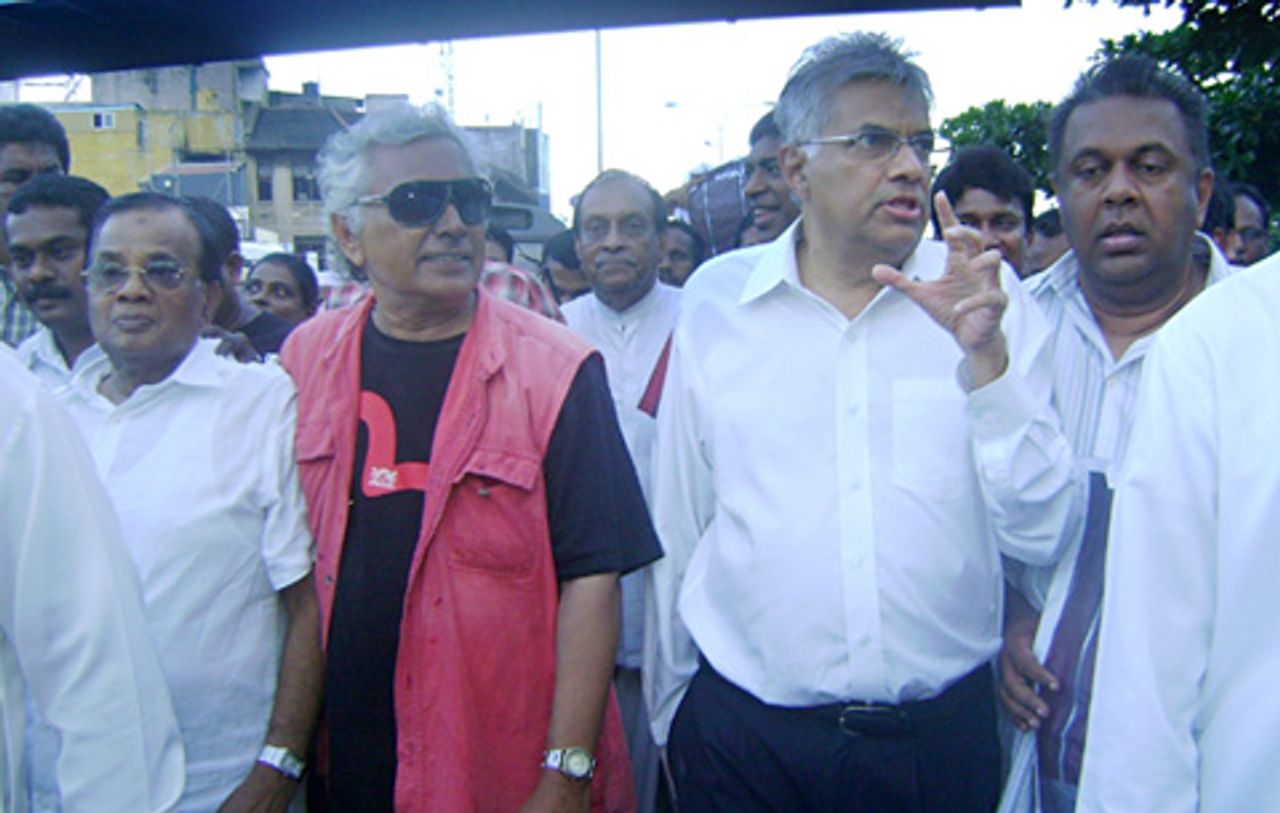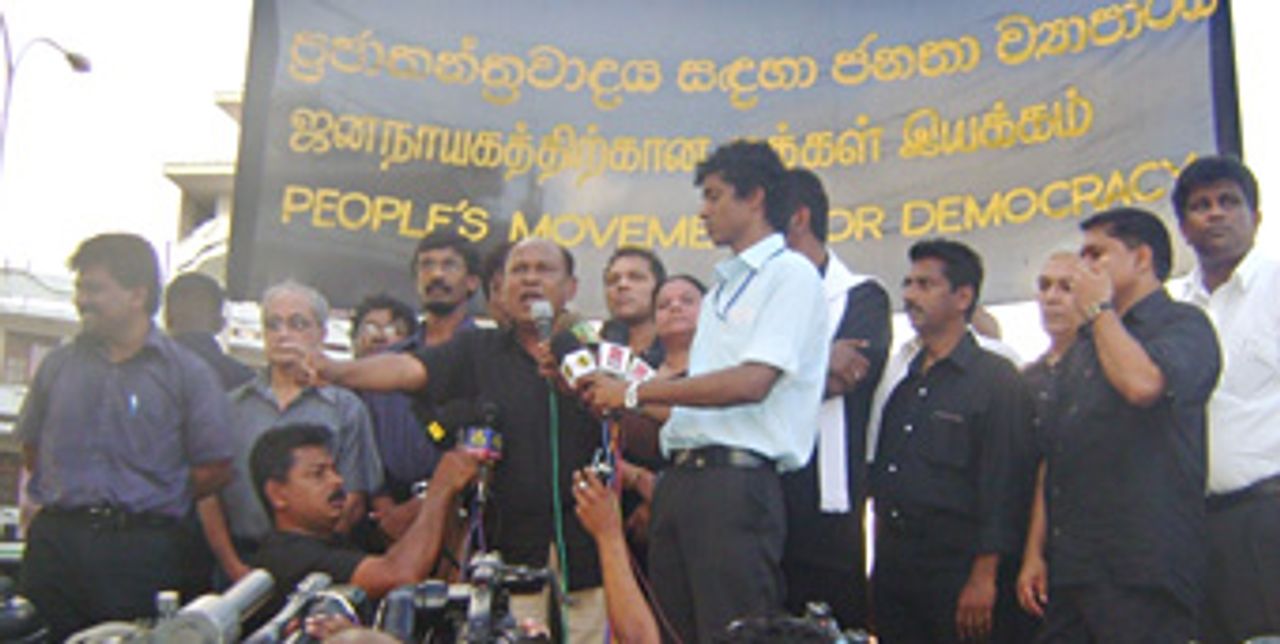Opposition parties in Sri Lanka have staged a series of protests in Colombo against the conviction and jailing of Sarath Fonseka, former army commander and opposition presidential candidate.
The most recent protest, organised by the Janatha Vimukthi Peramuna (JVP), took place on Monday. About 5,000 people, mostly JVP supporters, marched three kilometres from Hyde Park in central Colombo to Welikada Prison where Fonseka has been jailed. The United National Party (UNP) and the ex-radicals of the Nava Sama Samaja Party (NSSP) and the United Socialist Party (USP) also participated.
Last week the NSSP and USP joined with the JVP and UNP to launch a petition to President Mahinda Rajapakse requesting Fonseka’s release. NSSP leader Wickramabahu Karunaratne and USP leader Siritunga Jayasuriya participated last Friday in a protest with the UNP in front of the Fort Railway Station in central Colombo.
The protests have emerged in response to growing concerns among working people about the Rajapakse government’s autocratic methods of rule. However, these campaigns—the JVP’s “People’s Movement for Democracy” and the UNP’s “People’s Movement against Dictatorial Insanity”—are designed to limit and block any genuine struggle for democratic rights.
The focus on Fonseka’s arrest ensures that the “movement” has a right-wing, communal character from the outset. As army commander, Fonseka directed the brutal military offensives against the separatist Liberation Tigers of Tamil Eelam (LTTE) after President Rajapakse restarted the country’s protracted civil war in mid-2006.
Fonseka fell out with Rajapakse after the LTTE’s defeat in May 2009, resigned and stood as the common candidate for the UNP and JVP in the presidential election in January. Despite winning the election, Rajapakse still regarded Fonseka as a political threat. Amid lurid accusations that Fonseka was plotting a coup, he was arrested by the military, tried in closed courts-martial and found guilty on trumped-up charges. He has been dishonourably discharged from the military, jailed for three years and stripped of his parliamentary seat.
The jailing of Fonseka is certainly a travesty and he should be immediately released. But the treatment meted out to Fonseka is only part of a far broader, systematic abuse of democratic rights, particularly of the country’s Tamil minority, during and since the civil war. As army chief, Fonseka was responsible, along with Rajapakse, for the killing of thousands of civilians, as well as hundreds of “disappearances” and murders carried out by pro-government death squads. It is for these war crimes that Fonseka, along with Rajapakse and other senior government and military figures, should be charged and tried.
The JVP and UNP, however, hail Fonseka as a “war hero”. Both parties, steeped in Sinhala communal politics, fully backed Rajapakse’s criminal war and defended the military’s gross abuses of democratic rights. Their so-called defence of democracy does not extend to demanding the immediate release of thousands of Tamil youth detained without trial as “LTTE suspects” or the repeal of the draconian legislation under which they are held.
The right-wing politics of the “democracy” movements was on display on Monday after the march ended. JVP leader Somawansa Amarasinghe told the crowd: “The services General Sarath Fonseka rendered and the sacrifices he made for the country are immeasurable. The walls of the prison are not enough to contain his stature... If the government does not release General Fonseka, the prison wall will be torn down, and the authorities will be made to release him.”
The JVP is routinely characterised as a “Marxist party” in the media, but it has nothing to do with Marxism or socialism. Formed in the 1960s on the basis of Maoism and Sinhala communalism, the JVP has ditched its former socialist phrase-mongering. In the late 1980s, the party launched a reactionary patriotic campaign against the Indo-Lanka accord and killed hundreds of political opponents and trade unionists who opposed their actions.
None of the top UNP leaders spoke at Monday’s protest. However, UNP parliamentarian Dayasiri Jayasekera lent his support to the JVP leadership, denouncing Rajapakse and calling on the president to ask for a pardon from the people. (Fonseka has rejected any suggestion that he should admit his guilt and ask for a pardon.) “We will fight to release Fonseka by taking this struggle ahead,” Jayasekera declared.
Like the JVP, the UNP, a right-wing bourgeois party, is notorious for its own abuses of democratic rights. The UNP launched the civil war in 1983 by instigating widespread pogroms against Tamils in Colombo and other towns. After contemplating an alliance with the JVP in the late 1980s, the UNP government turned on JVP supporters and its support base among Sinhala rural youth—an estimated 60,000 young people died at the hands of the security forces and their death squads.
 NSSP leader Wickremabahu Karunaratne (red vest) with UNP leader Ranil Wickremesinghe (second right)
NSSP leader Wickremabahu Karunaratne (red vest) with UNP leader Ranil Wickremesinghe (second right)The key role in dressing up the JVP and UNP as “defenders of democracy” is being played by the ex-lefts of the NSSP and USP. After the march on Monday, NSSP leader Karunaratne joined in the political demagogy, warning Rajapakse that many more thousands of people would come onto the streets unless Fonseka were released. Fonseka should not seek a pardon, he declared. “Why should someone who has not committed an offence ask for a pardon?”
Paying lip service to the Rajapakse government’s broader abuses, Karunaratne added: “Today people ask for democracy, people are against the dictatorship. Thousands of youth are in prisons in the North and East. We are also working on their behalf. We all say release Fonseka. The journey we made today will go on until Fonseka is released.”
Significantly, however, Karunaratne made no mention of the fact that Fonseka, along with the Rajapakse government, was responsible for the detention of these Tamil youth without trial. Nor did he point out that the UNP and JVP have no intention of “working on behalf” of the Tamil prisoners. With a long history of involvement in opportunist front organisations, Karunaratne will not do or say anything to expose the reactionary politics of his allies.
 USP leader Siritunga Jayasuriya speaking
USP leader Siritunga Jayasuriya speakingUSP leader Siritunga Jayasuriya was even more explicit. After declaiming that people would break down the prison walls, like people in Germany destroyed the Berlin Wall, he added: “To defend democracy in this country, we will unite by setting aside party, colour and ethnic differences.” In the lexicon of opportunism, “setting aside party differences” means only one thing: no criticism of the JVP and UNP.
The jailing of Fonseka is a sharp warning to the working class. If a former army chief and bourgeois presidential candidate can be convicted on bogus charges, the government will have no hesitation in using far more draconian measures against workers who resist its attacks on jobs, conditions and living standards. Under pressure from the International Monetary Fund, Rajapakse is about to announce a new round of austerity measures in next month’s budget.
The NSSP/USP campaign seeks to block any independent political movement of the working class and to keep it tied to capitalist parties such as the UNP and JVP. Workers can only defend their democratic rights and living standards through a complete break from every faction of the capitalist class and a fight for socialist policies and a workers’ and farmers’ government as part of struggle for socialism in South Asia and internationally. That is the program fought for by the Socialist Equality Party.
